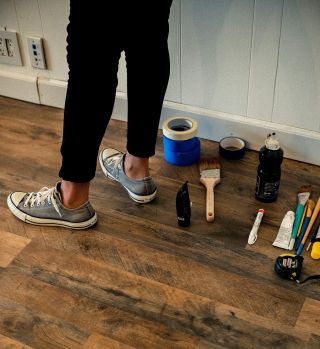Grief
When Healing Both Helps and Hurts
Personal Perspective: Even good changes can be complex in grief.
Updated March 12, 2024 Reviewed by Ray Parker
Key points
- Loss can leave your life frozen in time.
- In adjusting to loss, you may have to rediscover who you are, minus your loved one.
- Clinging to the past and changing for the future can be emotionally challenging.

It had been immobile in my driveway for nearly four years, but I finally sold Tom’s truck, a Ford F150, which he had bought in 1993. He called it Big Black and drove it until it was a jalopy.
I cried as Big Black sailed away on a flatbed trailer (it ran, but just barely), but I knew it was time. The good news is that the fellow who bought it—he repairs my appliances—plans to get it running and use it.
“You’ll see it driving around the neighborhood,” he said. How odd will that be? Odd, but good. Better Big Black have a new life than be crushed into scrap.
I’ve also started changing things around the house, having come to the realization that I lived in a house that was exactly as it had always been, minus the most important part. With things essentially unchanged since the day Tom left for work and didn’t return, it had become a museum of my marriage. And this had stopped feeling comforting and started feeling oppressive, like being surrounded and suffocated by the loss.
I don’t know how long it would have taken me to awaken to this if a friend with a passion for DIY hadn’t started campaigning to freshen up my charming but tired bathroom. Half to humor her, half because I liked the idea, I agreed. She came over with tools and strippers and cleaning implements and even painters’ coveralls, and the two of us sanded and painted and scrubbed and shopped (I know—lucky me to have a friend like that), and by the time we were done, I knew this would be just the beginning.
Starting Small and Cautiously
I’ve made only small changes so far: hanging a couple of new light fixtures, rearranging furniture, replacing the blinds in the living and dining rooms. I’ve also sold some things and packed away a lot of bric-a-brac; someday, I might dispose of it, but I’m not doing anything permanent at the moment.
Some mementos of our past together feel precious now, others irrelevant. I am deciding what in the house was his taste and what is mine—what do I want to keep, what no longer suits my vision? When you are together as long as Tom and I, you start forgetting where the other person ends and you begin. Your edges blur. In addition, it’s easy just to let the house be—let it develop in layers, like geological strata. Now, I am mining the layers, separating gold from slag.
And these changes mark a milestone in my grief. Rather than sleepwalking amid the vestiges of our life together, I am looking around, taking stock, and creating my own place.
I am proud of myself and greatly enjoy my new environment, even unfinished.
Change Is Necessary but Painful
I am also profoundly sad as I do it. Because in grief, even healing can hurt. Each step forward in healing is a sign of acceptance. Healing means truly believing that Tom is gone, never to return. And I don’t wanna.
I am moving forward not out of choice but rather because moving backward is not an option, and standing still no longer feels good. Holding on accomplishes nothing, so I am letting the past slip from my grasp. At least the sadness I feel every time I discard something from our past will someday be behind me, whereas hanging on to the flotsam of a life I can’t recapture just clogs up my future with sad reminders.
I’m converting the guest room/Tom’s dressing room into a guest room/sewing room, and that is proceeding very slowly. I have moved my sewing machine in there and rearranged some furniture, but the next stage will require delving deep into Tom’s closet, where a lot of his clothes still hang, and shelves hold boxes of his personal goods. This is the hot stove of my grief—I can only touch it briefly. I’ve disposed of some clothes and two boxes of books, but doing anything in the closet requires pauses for tears, so I haven’t got far yet.
In fact, I have had to take breaks from the whole endeavor from time to time to let all my sad and complicated feelings settle again before proceeding.
Since I started making changes to the house, I’ve had dreams about Tom from which I’ve woken crying. I’ve also had nightmares. Daytime brings random moments of memory and tears. He hasn’t been on my mind more than before—that’s not possible—but the memories feel tender like a bruise these days. The change has churned me all up. There is a disruption in the force.
At the same time, when I step into the rooms I have changed, they bring me pleasure and satisfaction. I am proud that I have made changes and pleased with what I have done. Taken objectively, the changes feel good. The rooms are less cluttered, physically and emotionally. While I can picture Tom in the rooms, I can’t remember him there because he never has been. And yet I still see his paintings on the walls, I still remember when we bought the sofa together.
The rooms aren’t so changed that I don’t feel at home, but it is like a breeze has blown through. There is more room, somehow, for my future. Whatever it will be.




